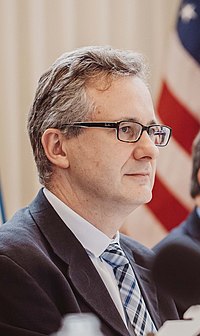Denis Wirtz
| Denis Wirtz | |
|---|---|
 |
|
| Born |
Denis Wirtz February 20, 1965 Brussels, Belgium |
| Nationality |
United States Belgium |
| Alma mater |
Université libre de Bruxelles (B.S.) Stanford University(M.S., Ph.D.) |
| Known for | 3D Cell Motility Digital Pathology Cancer Metastasis Nuclear dynamics Tumor Microenvironment Particle-tracking Microrheology |
| Awards | Fellow of the American Physical Society Fellow of the American Association for the Advancement of Science (AAAS Fellow) Fellow of the American Institute for Medical and Biological Engineering National Science Foundation CAREER Award Biomedical Engineering Foundation Award, Whitaker Foundation Hoover Fellow, Belgian American Educational Foundation |
| Website | Vice Provost for Research Webpage |
| Scientific career | |
| Fields |
Chemical Engineering Biomolecular Engineering Pathology Oncology Materials Science |
| Doctoral advisor |
Gerald G. Fuller(Ph.D.) Pierre-Gilles de Gennes(Postdoctoral Fellowship) |
Denis Wirtz is the Vice Provost for Research and Theophilus Halley Smoot Professor of Engineering Science at Johns Hopkins University. He is an expert in the molecular and biophysical mechanisms of cell motility and adhesion and nuclear dynamics in health and disease. Notably, he was the first to establish how a 3-dimensional environment fundamentally affects the way cancer cells migrate, providing more biologically and medically-relevant information than 2D studies. He also pioneered the technique of particle-tracking microrheology to probe the rheological properties of complex fluids and living cells and tissues. He is a professor in the Departments of Chemical & Biomolecular Engineering and Materials Science & Engineering in the Whiting School of Engineering, and in the Departments of Oncology and Pathology in the Johns Hopkins School of Medicine.
Wirtz was named Vice Provost for Research in February 2014, charged with directing the university’s $2.24 billion research enterprise, the largest in the United States, implementing institutional research compliance, expanding research development, and producing and managing cross-divisional research initiatives, such as the Johns Hopkins Catalyst and Discovery Awards] program, the President's Frontier Award program, and the Bloomberg Distinguished Professorships, which were established as part of a $350 million gift by Michael Bloomberg.
...
Wikipedia
